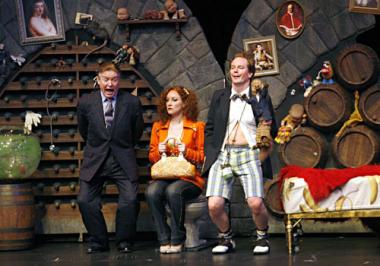All four summer theater shows I caught last week begin with a defining sound: a musical motif, a ship’s horn, a laugh, a hammer on nail. Each one, heard before the lights even come up, gives us an aural clue to what we can expect of the play’s style and content.
Wittenberg, at Chester Theatre Company, is a fanciful prequel to Hamlet—the student prince caught indecisively (what else?) in the middle of a theological debate between his two university professors, Martin Luther and Doctor Faustus. The sound of hammering makes us think of Luther, father of the Protestant Reformation, pounding his famous 95 Theses onto the church door. But then we see that it’s Faustus, the faculty skeptic and iconoclast, posting a flyer for his extracurricular singer-songwriter gig at the local pub. That gag nails the spirit of David Davalos’ play, a literary-historical pastiche that’s bursting with Stoppardian wordplay and witty reflections on faith, friendship, cosmology and the agonies of free will—a brilliant capper to Chester’s adventurous season.
Red-Hot Patriot, at Shakespeare & Company, begins with a throaty chuckle, an almost bawdy, shared-secret cackle: Tina Packer’s trademark laugh. It lets us know right off that this one-woman biography of journalist Molly Ivins, the quick-witted scourge of right-wing politicos, is above all a display of Packer’s own indomitable spirit. The show seems to be a vanity vehicle for the company’s founder, who shares Ivins’ passion for justice and contempt for predatory power, but cannot land a punch line lightly, keep her English vowels out of Ivins’ Texas twang or, on the night I saw it anyway, remember her lines.
The overture to The Game, at Barrington Stage, begins with a musical quote from “La Marseillaise.” Based on Les Liaisons Dangereuses, this tuneful, edgy musical version deftly intertwines the playful with the painful as it details a not-so-merry go-round of sexual intrigues in 1782 Paris. The stage soon fills with an explosion of Jennifer Moeller’s luscious period costumes, some of which come off almost as soon as they’ve come on, as the game of wicked wagers and voluptuous pleasures plays out. The little necklace of notes at the top of the show reminds us that the revolution that will sweep away its aristocratic players is only six years away.
A steamship’s pompous horn, sounding as it glides into New York harbor, sets the tone for Autres Temps, one of Edith Wharton’s stories of high society’s faults and foibles: the old gentry’s settled habits and assumptions about to be disturbed by winds of change. The play is part of the Wharton Salon’s revivals at The Mount, the author’s home in Lenox. A middle-aged divorcee, long ostracized by her peers, returns from European exile for her divorced daughter’s remarriage, hopeful for her own rehabilitation in these “other times” of evolved morality. Diane Prusha gives an affecting performance as the lady, more sinned against than sinning, but the production is treacle-slow and over-wordy, and director Catherine Taylor-Williams’ notion of moving the time period from 1911 to 1962, on the cusp of the feminist revolution, is not convincingly established.”



